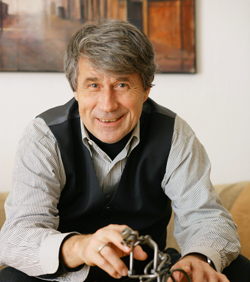

| A
passionate
cross
border
(net)worker |
||
| As a Geographer and Urban Planner I am a cross
border (net)worker between science,
planning and politics. My scientific work was made as a research and
teaching
professor for Applied Geography, Urban and Regional Development and
Spatial
Planning at Trier University, where I retired end of 2011. My political work included the responsibility for governmental programs in Regional and Urban Planning and Mobility concepts on the federal level in the 70ies |
 |
| |
and
80ies and Länder level in Northrhine-Westfalia in the 80ies and
90ies,
including model programs and investment subsidies for urban renewal,
traffic
calming, bicycle promotion and innovative public transport.
Since the 60ies I have been deeply engaged in a fight for livable places, vital public spaces, innovative public transport and a world with less cars and more attractiveness for cycling and walking. I am fighting against extremely expensive and gigantic infrastructure projects like the Stuttgart 21 underfloor station or the different high speed train projects of the Trans European Networks. I integrate new trends in mobility behavior into my conceptual work and put much effort into the future of car sharing, car2Go and bike sharing concepts and a flexible organization of public transport including modern paratransit. I believe in a splendid future of the green modes worldwide. I am running the private planning and consulting agency raumkom Institute for spatial development and communication in which 7 young scientists and planners are working hard to convince decision makers on all administrative levels to change the ordinary business as usual practice for courageous innovations. The main office is located in Trier. Increase the desire for a better future Though I have collected many data about critical aspects of our car-mania I strongly believe in the necessity of positive visions of a better life and much more efficient mobility with less cars. I want to show the advantages of modern, innovative, sustainable organization of transport with a high service level and a better efficiency. We have the choice to waste or to use our chances. So I prefer positive forecasts. Intense use of mass media Reasonable research needs publicity for good ideas. That is the reason why I cooperate as often as possible with mass media. They may support the distribution of new ideas and concepts with their broadcast, TV, newspaper and journal stories, telling about the great successes which can be reached by innovative planners and politicians. I have prepared several exhibitions about greening urban transport either through cycle and walking promotion (RADLUST 1.0 and RADLUST 2.0) or attractive transit investment (SPURWECHSEL). Learning from abroad (f.e. Copenhagen, Zurich, Basel, Oxford, Münster, Groningen, Freiburg, Boulder, Portland, Paris) is a constant source of inspiration. Why do politicians block innovations? The programs of most political parties are not at all innovative when it comes to transport, mobility and urban development. They still concentrate all efforts on an expansion of the inefficient car system, by funding street network and car parking capacity expansion and defending privileges for car owners and car manufacturers. And they continue the strategy of urban sprawl. You hardly find prominent politicians who really believe in the future of the green modes and support them by changing the administrative and fiscal frame. My vision: change is possible After having fought for a radical change in urban and transport planning concepts I still believe in the chance for a change, if we combine the innovative experiments of selected towns as mentioned above. There are many good reasons for a change, some reasons have to do with the global problems of climate change, energy waste and public health, others are more relevant on the national and local level such as the quality of urban environment and social interaction on public spaces. The postfossile age needs new answers. The modern life style includes much more inter- and multimodality and a high awareness among more and more people that efficiency will be a central criteria for the future: space efficiency and energy efficiency. Both aspects necessarily force us to give much more priority to the three green modes of walking, cycling and public transport including car and bike sharing. Spatial planning needs to reduce distances and increase land use densities and mixture. Let's fight for a better and more sustainable future, wherever we have responsibilities. I invite you to go through the different pages, to make use of the presented material and to start a dialogue by contacting me Yours  |